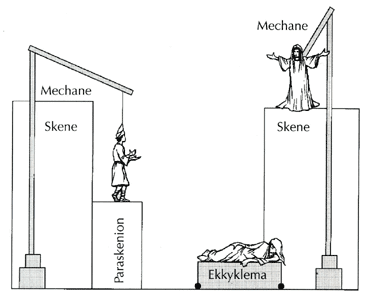Ancient Greece Webquest - All About Greek Theater
Directions: This series of websites is designed to take you on a journey to discover more about ancient Greece and ancient Greek theatre – the foundations of our modern theatre. View the following websites in the order they are listed and answer any questions that I have listed under any particular website before moving on to the next website. Write your answers on the worksheet provided. Be sure to put your first and last name and period number on the top of the page. Enjoy!
Website 1: http://www.greeklandscapes.com/greece/ancient_theaters.html
This website shows several different Greek Theaters. Click on a few of the pictures to see what they looked like

Website 2: http://user101.tccc.cc.nc.us/swood/DRA/GreekTheaterDiagram.html
Use the website above to:
a) Label the diagram of the Greek Theatre.
AND
b) Write a description of each part: what is was and what it was used for. Use your own words here (paraphrase). Do not just copy from the website directly.

Website 3:
Now go to this website: http://www.bbc.co.uk/schools/primaryhistory/ancient_greeks/arts_and_theatre/
Use the website above to answer all of the following questions:
Where geographically were theaters typically located?
Who primarily were the actors in plays?
What is a chorus and where did they perform?
Where did the actors change their costumes?
What was the first kind of scenery?
On this current website click on the side tab that says “What were Greek plays like?” to continue...
What are the 4 things the ancient Greek actors wore during their performances? Be sure to list all 4 things mentioned!

Website 4: http://artsedge.kennedy-center.org/interactives/greece/theater/playersProps.html
What are 3 reasons the actors in ancient Greece wore masks?
What were the masks made of?


Website 5: http://www.parsonsd.co.uk/theatre/parts_of_theatre.php
Where does the English word “theatre” come from?
Who got to sit in front?
Website 6: http://greece.mrdonn.org/theatre.html
Describe the three types of plays and what they typically did.
Website 7: http://www.ancientathens.org/people/thespis
Who was Thespis?
What is a “thespian”?
Website 8: http://www.britishtheatreguide.info/articles/230400b.htm
In ancient Greek theater, how many actors could be on the stage at one time during a tragedy?
Just imagine you were a famous person living in ancient Greece and one night you decided to go to the theater; what is the likelihood of you hearing your name mentioned in a tragedy in that night’s play? (Make sure you read the entire article on tragedy before you answer this question; just sayin’).
Why does it matter that ancient Greek plays were based on myths? How did this affect the audience’s relationship with the plays?
Where did violent actions in the plays take place?
Website 9: http://www.wou.edu/~aarndt08/myweb/tech.html
What are these three mechanical devices (hey tech people this is the first use of tech!!!) used in ancient Greek theater? Explain their function.
1. Periaktoi
2. Mechane
3. Ekkyklema

Website 10: http://www.merriam-webster.com/dictionary/deus%20ex%20machina?scrlybrkr=5725a368
What does deus ex machina mean?
Website 11: When you’ve finished.... go to this link:
http://www.bbc.co.uk/schools/primaryhistory/ancient_greeks/greek_world/teachers_resources.shtml
And click on “The Greek Theater – 2,350 years ago!” under the Activities category... this is a little review game for you... and then you are DONE! Thanks!
